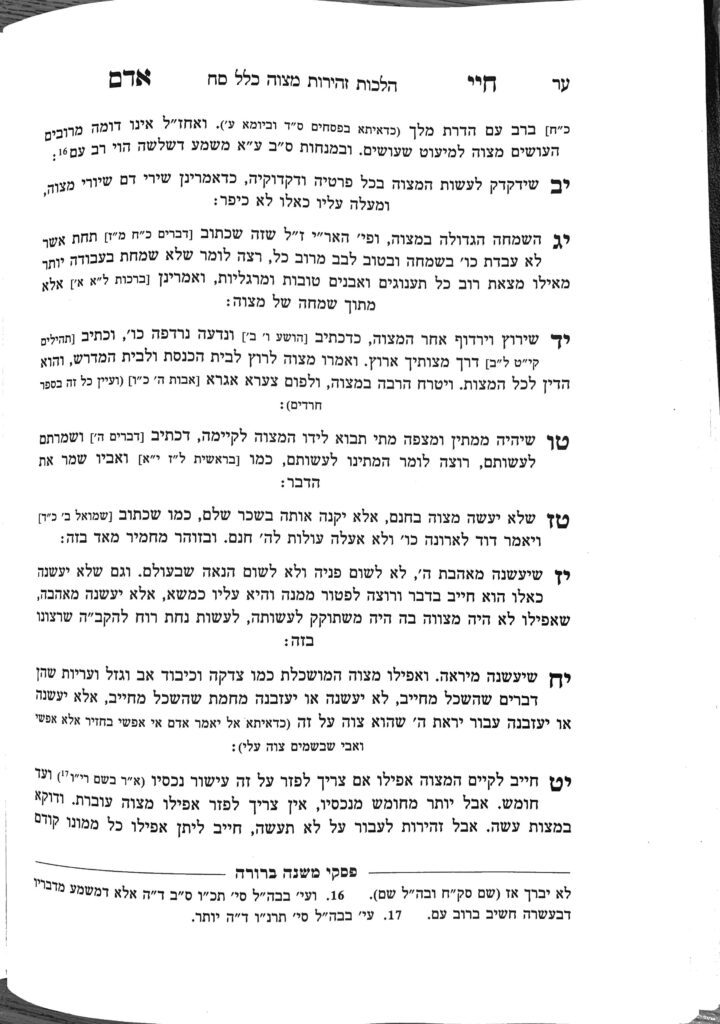We are continuing in siman 19, discussing the halachos of spending money on mitzvos. We learned about investing tircha into a mitzvah, and now we will return to discuss the monetary aspect.
The Bavli never directly states that the takana of Usha, which states that one should not give more than one fifth of their money towards tzedakah, applies to mitzvos as well. Although the Yerushalmi does apply it explicitly to other mitzvos, it is not explicit in the Bavli.
Regarding tzedakah, the logic behind the takana is so that a person himself does not become poor due to giving tzedakah. In the context of tzedakah, the takana makes sense, as seeing that the entire purpose of tzedakah is to alleviate poverty, the takanah was put in place to ensure the giver does not become poor either. How does this concept apply to other mitzvos?
The Raavad explains the takanah a little differently. He writes that Chazal say ani chashuv k’meis, an impoverished person lives a life which is so difficult in so many ways they are considered dead. The Raavad explains that Chazal do not require a person to kill themselves for a mitzvah. By investing more than one fifth of their money into a mitzvah, a person is potentiallydoing something akin to killing themselves, and Chazal did not require one to put themselves in danger, as it were, for a potential mitzvah. This exemption does not apply to transgressing aveiros, but will apply to shev v’al taaseh, sitting back and refraining from performing a mitzvah.
This explanation fits well with what the Chofetz Chaim writes in the name of the Chochmas Adam in Ahavas Chesed. The Chofetz Chaim writes that if a person is extremely wealthy, they may give more than one fifth of their money to tzedakah, because we are not concerned they will become impoverished. If a person is making an average amount of money, we are concerned that such a large amount of their income will imbalance their budget, but when a person is significantly wealthy, we are not concerned.
There are other understandings as well. The Netziv understands that Chazal were concerned for kavod habriyos. Kavod habriyos does not allow one to transgress averios, but it does allow one to refrain from doing something which is embarrassing. Chazal understood that giving away more than one fifth of a person’s money can lead to a concern of kavod habriyos, because a person can become impoverished which will lead to embarrassment. The Netziv’s understanding is not as extreme of a concern as the Raavad, but is a similar concept.
A third understanding is brought by sefer Shomer Mitzvah, which quotes the Pischei Teshuva in Yoreh Deah. He explains that the Gemara brings multiple reasons behind the heter to violate Shabbos to save a person’s life. The most famous one is the idea of vachai bahem, that one should live and not die as a result of mitzvos. The Gemara also brings an explanation that the pasuk says veshamru b’nai Yisroel es hashabbos. . . la’asos, literally, keep Shabbos in order to do Shabbos. Meaning, if a person is in a situation in which transgressing one Shabbos will allow them to keep many Shabbosim in the future, they are allowed to break Shabbos. The Pischei Teshuva suggests that giving away more than one fifth of one’s money at the moment may prevent a person from fulfilling many other mitzvos in the future, so they are exempt in a similar way that one is allowed to transgress one Shabbos in order to observe many others. Either way this exemption of more than one fifth only applies to refraining from a mitzvah, not transgressing an aveirah.
Summary
A person must spend up to one fifth of their money in order to fulfill a mitzvah. A person must give up all of their money to avoid performing an aveirah.



